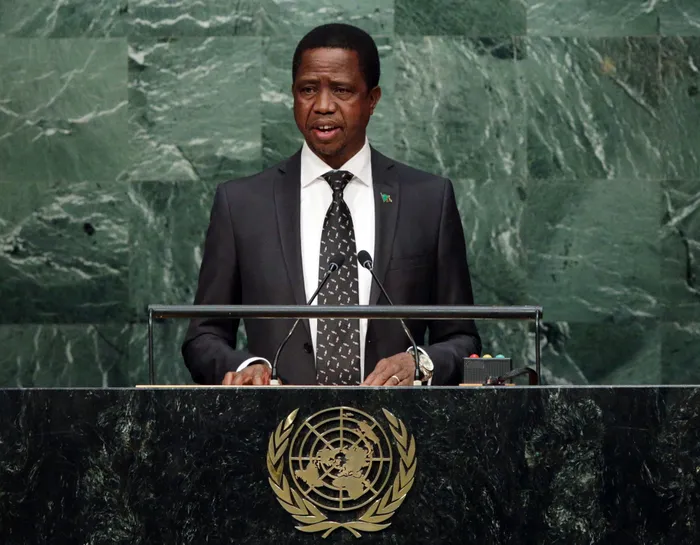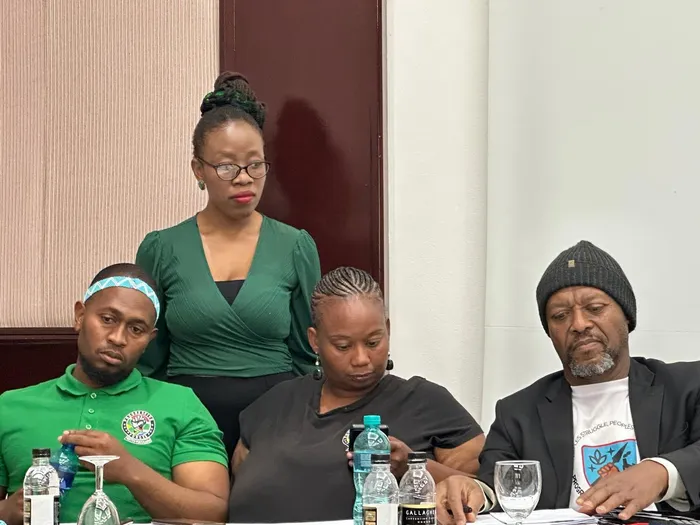The mystery of former Zambian president Edgar Lungu’s body: Five months in South Africa amid poisoning allegations

Former Zambian president Edgar Lungu’s remains are still in South Africa five months after his death, as questions over possible foul play continue to surface.
Image: File
The body of former president of Zambia, Edgar Chagwa Lungu, is still stuck in South Africa, five months after his mysterious demise at a Pretoria hospital.
In August, IOL reported that the High Court in Pretoria had ruled that Lungu’s body must be released for repatriation to his home country for a state funeral. Delivering judgment, Deputy Judge President of the Gauteng Division, Aubrey Ledwaba, said: “The court in this case concluded that the government of Zambia is entitled to proceed with the state funeral for the late president of Zambia.”
“The order of the court reads as follows … it is ordered that the applicant (government of Zambia) is entitled to repatriate the body of the late president, Edgar Lungu, for a state funeral and burial thereafter in Embassy Park, in Lusaka, Republic of Zambia.”
The court further ordered Lungu’s family to surrender the body to representatives of the Zambian government to enable repatriation.
But this week, IOL investigations have established that the African statesman’s remains still lie in a mortuary in Gauteng, with no clarity on the cause of the continued delay.
Some sources alleged that accusations of poisoning are being exchanged within Lungu’s family and that these tensions have stalled the repatriation process.
IOL approached the South African Police Service (SAPS) for clarity, but national spokesperson Brigadier Athlenda Mathe said she was not aware of the allegations.
However, IOL has unearthed a letter addressed to Acting Minister of Police Firoz Cachalia, and copied to Gauteng police commissioner Lieutenant General Tommy Mthombeni, in which activists from the Progressive Forces of South Africa demand a police investigation into the circumstances surrounding Lungu’s death.
In the letter, the activists argue that several prominent Zambian figures — including Patriotic Front (PF) secretary-general Raphael Nakacinda, PF MP Brian Mundubile and Lungu’s daughter Thasila Lungu — have publicly raised suspicions that the former president was poisoned.
Citing South Africa’s Inquests Act, the activists insist that police are constitutionally obliged to investigate any death that may involve foul play.
“A failure to investigate credible allegations of poisoning undermines this constitutional obligation and compromises the integrity of South Africa’s justice system,” the letter states. A handwritten note shows the document was received by a SAPS officer, Captain Pule, on 29 September 2025.
The Progressive Forces of South Africa have long been vocal on the Lungu matter. In July, they told IOL that burying the former Zambian leader in South Africa would draw a wave of Zambians into the country, arguing that many would “end up staying in South Africa”.
They publicly called for his remains to be repatriated, framing the burial issue as both a political and immigration concern.

(From left) Mthetho Ngcukayitobi, Lebogang Shovhote, and Bonang Sepoloane of Progressive Forces of South Africa sitting next to Mthunzi Luthuli from the Progressive Civics Congress, demanding that the body of former Zambian president Edgar Lungu be repatriated to his home country.
Image: Jonisayi Maromo/ IOL
Allegations of poisoning
Separately, The Star reported in June that, with the cause of Lungu’s death yet to be officially confirmed, speculation has swirled around claims that he may have been deliberately poisoned. Although no forensic evidence has been made public, the Patriotic Front has called for an independent international investigation into the circumstances surrounding his death.
Lungu’s daughter, Tasila Lungu-Mwansa, confirmed in a public statement that her father had been unwell for weeks and had travelled to South Africa under medical supervision. She also alluded to the family’s belief that his deteriorating condition may have been the result of “external interference” — a veiled reference to suspected foul play.
PF leaders have been more direct. “This was not a natural death,” said PF MP and senior party figure Brian Mundubile. “We believe this was orchestrated to eliminate him politically and permanently.”
While legal and diplomatic tensions have dominated the aftermath of Lungu’s death, his political trajectory in the years leading up to it adds further complexity. In June, The Star reported that Lungu, who served as Zambia’s sixth president from 2015 to 2021, had announced a political comeback in late 2023 after a period of relative quiet following his electoral defeat to current President Hakainde Hichilema.
But what began as a return to frontline politics swiftly escalated into a contentious and, some claim, dangerous standoff with the ruling administration.
A contested comeback
In December 2024, the Constitutional Court ruled that Lungu was ineligible to contest again, arguing that his first, partial term from 2015 to 2016 counted as a full term under Zambia’s two-term presidential limit.
Lungu’s legal team and supporters condemned the ruling as politically orchestrated, pointing to his strong grassroots support and growing alliances within opposition formations. They argued that his return posed a significant political threat to the ruling United Party for National Development (UPND).
Critics say the court ruling marked only the beginning of a broader effort to bar Lungu from national politics — a campaign that intensified as his political influence appeared to rise.
His sudden death in South Africa in June this year, followed by competing claims about the circumstances, has deepened political suspicions both in Zambia and among the diaspora.
Five months later, uncertainty still hangs over Lungu’s remains, his cause of death, and the protracted efforts to return his body home for burial.
jonisayi.maromo@iol.co.za
IOL News